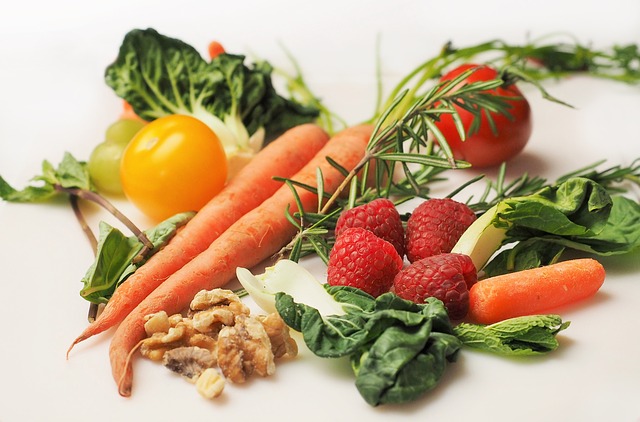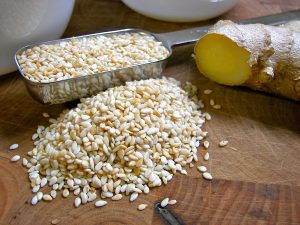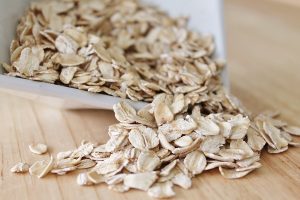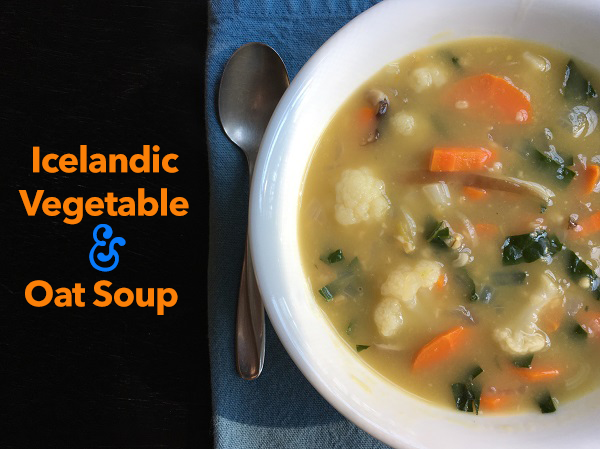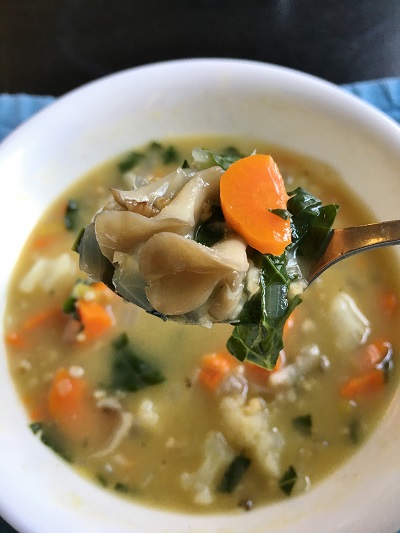It’s that time of year again! Time for colds and runny noses and sniffles and sneezing. With an 11 month old in daycare, I am very aware that it is cold and flu season. Luckily there are plenty of things that can be done to help prevent colds and other illnesses (as much as possible) and give your immune system a boost this winter.
You might have already heard that somewhere around 70% of our immune system is in our GI track. So, anything you can do to keep your GI tract happy will help keep your immune system running smoothly. There are also a few key nutrients and foods you want to make sure you include this winter!
Vitamin A
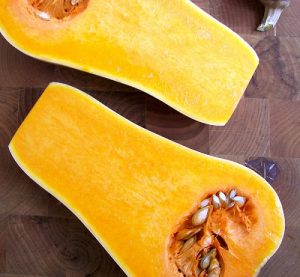 Vitamin A is essential for maintaining the integrity and function of all mucosal surfaces, which is front line defense against those germs and viruses! Adequate Vitamin A is a MUST for a healthy immune system.
Vitamin A is essential for maintaining the integrity and function of all mucosal surfaces, which is front line defense against those germs and viruses! Adequate Vitamin A is a MUST for a healthy immune system.
There are two main sources of vitamin A:
- Animal-based: pasture raised eggs, grass fed dairy products and liver, which provide retinol.
- Plant-based: carrots, sweet potatoes and butternut squash which provide pre-formed vitamin A, or carotenoids.
The carotenoids from plant-based sources must be converted to retinol to be functional in the body. Some of us have a genetic variant for the enzyme that is required for this conversion, meaning that we might have a slow or low conversion rate. This could result in low Vitamin A levels or Vitamin A deficiency if you are only consuming the plant-based versions, so I would highly encourage you to get at least some of your Vitamin A from high quality animal foods.
Since Vitamin A is a fat soluble vitamin, more is NOT better. Too much can be toxic. The daily RDA for Vitamin A is 700mcg RAE (retinol activity equivalents) for females (770mcg RAE if pregnant and1300mcg RAE if breastfeeding) and 900mcg RAE for males.
Vitamin D
Vitamin D is known to be a potent modulator of the immune system. There are Vitamin D receptors on almost every cell of the immune system, so your vitamin D status can profoundly impact your immune health. Vitamin D also has antimicrobial actions and has been found to help protect against infections.
Studies have shown that:
- people with Vitamin D deficiency are 11 times more likely to get a cold or the flu.
- supplementing with Vitamin D can reduce colds and flu by 42%.
- children taking just 300IU of Vitamin D daily results in a 50% reduction in upper respiratory infections.
 We get the majority of our Vitamin D from sun exposure, but many of us aren’t outside enough for this to happen and during the winter we don’t make Vitamin D from the sun at all (for the majority of the U.S.). Only a few foods have more than 200 IU of Vitamin D per serving, so supplements are generally necessary. Salmon, mackerel, and sardines are the best food sources of Vitamin D. And getting some sunlight helps even if you don’t get any Vitamin D out of it during the winter time. Getting outside can help boost endorphins and regulate your circadian rhythms, both helpful for your immune system.
We get the majority of our Vitamin D from sun exposure, but many of us aren’t outside enough for this to happen and during the winter we don’t make Vitamin D from the sun at all (for the majority of the U.S.). Only a few foods have more than 200 IU of Vitamin D per serving, so supplements are generally necessary. Salmon, mackerel, and sardines are the best food sources of Vitamin D. And getting some sunlight helps even if you don’t get any Vitamin D out of it during the winter time. Getting outside can help boost endorphins and regulate your circadian rhythms, both helpful for your immune system.
Like Vitamin A, too much Vitamin D can be toxic since it’s also a fat soluble vitamin. It’s helpful to have your levels tested first to determine dosage needs. It’s pretty common for Vitamin D levels to be low, so a good place to start for most people is 1000IU per day during the winter time.
Zinc
Zinc is one of the minerals that has received the most attention for its ability to support immune function. Zinc is critical for normal development and function of many immune system cells. Studies have found that zinc deficiency results in a profound suppression of the immune system. Even marginal zinc deficiency can result in lowered immune function.
On the other hand, an excess of zinc has also shown negative effects on our immune function. So, it’s important to maintain an adequate but not excessive level of zinc. This is one reason food is such an excellent source of obtaining nutrients versus supplements.
Be careful with high dose zinc lozenges as 100mg or more may be immunosuppressive. High dose zinc, for an extended time, can also cause a copper deficiency (which effects your immune system as well). If you are taking zinc supplements make sure you are also taking copper.
Zinc is found in foods like oysters, grass fed beef, poultry, Swiss chard, collard greens, winter squash, cremini mushrooms, beans, pumpkin seeds and sesame seeds. The bioavailability of zinc from plant foods is lower than from animal sources.
Beta Glucans
Beta Glucans are a type of fiber found to enhance resistance to viral, bacterial, and fungal diseases. It can increase the efficacy of vaccines, increase mucosal immunity, and promote wound healing (when used topically). It’s found in oats, barley, certain mushrooms (like reishi, shiitake and maitake), yeasts, seaweed, and algae. Studies show that as little as 100-500mg per day can work as a preventive dose; for a reference, just a ½ cup of oatmeal has around 500mg.
Eat your way to a healthy immune system to not get sick this winter #saslife Click To TweetWhen looking at your overall diet:
- Limit added sugar and processed carbohydrates – sugar and processed carbohydrates can increase inflammation in the body (for up to 3 hours after eating them!) which can then lower your immune system function.
- Load up on non-starchy vegetables (all the colors!), and have 2-3 servings of fresh fruit daily- the different colors are all different antioxidants or phytochemicals which are needed to fight free radicals in our bodies and the fiber supports a healthy GI tract.
- Load up on garlic and ginger – both have been shown to have powerful antioxidant, anti-inflammatory and anti-microbial properties in addition to other immune boosting benefits.
- Take probiotics or eat fermented foods daily (plain yogurt, kefir, live sauerkraut, kim chi or other fermented veggies)– keeping the microbiome healthy is key to a healthy immune system.
- Eat enough protein (aim for around 0.5g-1g per pound body weight)* - proteins are the building blocks of our bodies, we need adequate protein for our body to produce antibodies and other immune system compounds. *Protein needs vary greatly depending on your size, activity level, and health. Please contact a Registered Dietitian/Nutritionist if you have questions.
- Eat Omega-3 rich foods 2-3 days per week - they play a role in the production and signaling of certain immune system cells SO they are very important! Omega-3 rich foods include wild salmon, sardines, herring, mackerel, pasture raised eggs, flax seeds, walnuts, hemp seeds, and chia seeds.
- Limit or avoid alcohol- alcohol can damage your gut lining which can impact your immune system
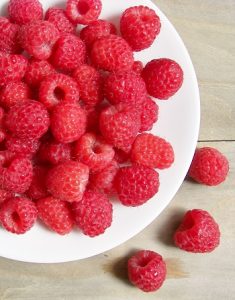 And then of course there is stress, sleep, and exercise. Chronic stress and inadequate sleep can deplete your immune system. Prioritize sleep and find ways to mitigate stress such as meditation (the Headspace app is great!), yoga, or even going for a walk outside (in the woods for added benefit!).
And then of course there is stress, sleep, and exercise. Chronic stress and inadequate sleep can deplete your immune system. Prioritize sleep and find ways to mitigate stress such as meditation (the Headspace app is great!), yoga, or even going for a walk outside (in the woods for added benefit!).
Exercise has a bell shaped effect. It can improve immune system functioning, unless you are doing too much, then it can negatively impact immune system functioning. What constitutes “too much” is different for everybody, so pay attention to your body. If you find that you get injured frequently, have a difficult time recovering from exercise, or have excessive fatigue, you might be overtraining. Talk to a qualified personal trainer (like we have at the RFC) for an appropriate program that includes rest days.
And wash your hands often! So simple, but it makes a huge difference in preventing illness!
Icelandic Vegetable and Oat Soup
Makes 4-6 Servings
Adapted from: SaltandWind.com
Ingredients
3 to 4 tablespoons extra-virgin olive oil
1 small yellow onion, finely chopped
1 medium leek, trimmed and thinly sliced
3 to 4 garlic cloves minced
5 to 10 shiitake mushrooms, thinly sliced
1 cup maitake mushrooms, sliced or broken up
3 to 4 medium carrots, cut into ¼-inch slices
2 cups cauliflower florets
8 cups bone broth or stock
½ cup steel cut oats
1 medium dried bay leaf
1 cup finely chopped kale (optional)
Sea salt and fresh ground pepper, to taste
Directions
- Heat olive oil in a large, heavy bottom saucepan over medium heat.
- Once heated, add onions and leeks and cook 5 to 6 minutes or until the onions are soft and transparent.
- Add garlic, mushrooms, carrots, and cauliflower and cook an additional 2 to 3 minutes.
- Pour in broth and add oats and bay leaf. Bring to a boil, reduce heat to low, cover, and simmer for 40 minutes.
- Stir in kale and continue cooking 10 to 15 minutes.
- Season with a few heavy pinches of sea salt and serve with fresh ground pepper.
